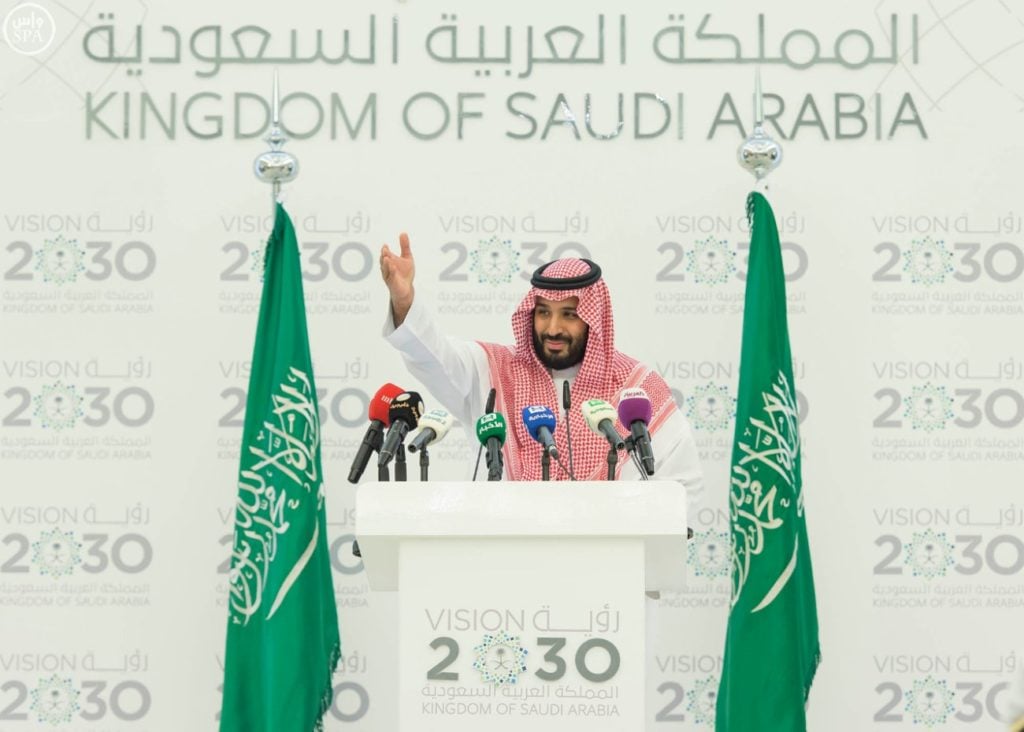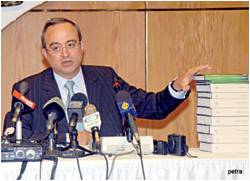
Deputy Crown Prince, Mohammed bin Salman announcing Saudi Arabia’s Vision 2030. (Al Arabiya)
Decision makers in the Middle East love coming up with visions. Every now and then, they spend large sums of money on agendas and long-term strategic plans, but they spend little, or nothing, on assessing the accuracy of their predictions and targets.
Steve Levitt often claims that “People lie, numbers don’t,” but both people and numbers lie some of the time! The sad reality is that Middle Eastern ‘experts’ are overconfident about one big idea which gets over-applied to this messy region. Come year Z of a country’s vision (and like most previous visions), everything will be forgotten, and the experts will say that “the conditionals underlying their government agendas were not satisfied” (e.g. changes in regimes, wars, famines, forced migration, anything related to ISIS, etc).
According to Egypt’s Vision 2030, the new Egypt will possess a competitive, balanced and diversified economy, through which an annual 7% GDP growth will be achieved (reaching 12% in 2030); investment attraction will rise to 30%; the share of services’ contribution to GDP will increase from 46% in 2013/14 to 70% in 2030; and unemployment will drop from 13% to 5%.
As for Saudi Arabia, its 2030 vision is a “country that will be the heart of the Arab and Islamic worlds, a leading global investment powerhouse, and a global hub connecting three continents (Asia, Europe and Africa),” as set forward by Deputy Crown Prince Mohammed bin Salman: “Our people will amaze the world again…. We are determined to build a thriving country in which all citizens can fulfill their dreams, hopes and ambitions…. We can strengthen the Kingdom of Saudi Arabia’s position as a great nation in which we should all feel an immense pride.”

Former Deputy Prime Minister of Jordan, Marwan Muasher, announcing, back in 2005, Jordan’s National Agenda of 2007-2017 (Petra News Agency of Jordan).
We will find similar assurances in the agendas of other Middle Eastern countries (e.g., Jordan 2025 [in addition to its previous National Agenda 2007-2017], UAE 2021, and Oman 2020). Unfortunately, bureaucrats and the media assume that ‘expertise’ is sufficient to anticipate the unfolding of events. This is not to mock the experts of the region which has a decent pool of well-connected leaders and analytical talent. But rather than simply declaring imperfection, both experts and decision makers do not confess their limited ability to predict the future.
Governments all over the Middle East were surprised by the Arab Spring (although the region has been under socio-political unrest and high unemployment rates for several decades) and later by ISIS taking over Mosul. The ‘experts’ declare then that whatever happened was ‘inevitable.’ So, they saw it coming, but did not include it in their predictions!
Looking, for example, at several economic pillars of previous government agendas, one finds that the results have not been as successful as anticipated. In order for Middle Eastern governments’ stories to work, one has to believe two things: (i) that only government officials accurately understand the visions (and have planned accordingly), and (ii) that when year Z arrives, they will be held accountable for their ‘predictive accuracy’!
The decision making ‘science’ of the Middle East should rather be uniquely unpredictable, whether we are talking economics, politics, or foreign policy (can anyone tell with precision for how long Qatar and Egypt will stay on bad terms with each other?). Being taught of their impressive mastery and being identified with attractive managerial positions, ‘experts’ in the Middle East do not yet recognize the “diminishing marginal predictive returns of knowledge.” In political and economic decision making, we reach the inflection point where the predictive value-added of PhDs, professorships, area expertise, and ‘enlightened’ leadership will be close to zero, which calls for a modest view: confessing the inherent unpredictability of the Middle East, as a start, and that no one can sharply predict its economic performance and political shifts.
There is nothing terrible in the above assessment. Humble work (rather than arrogance-driven policy making) will yield, over the long term, better decision making. Good policy ‘experts’ are not know-it-alls. Good experts are those who know that nobody can really convert the Middle East’s mysteries into the known. There might be no better place to start with than moderate, realistic policy targets.